Abstract
Objectives
Midlife women's knowledge, positive attitudes and management toward menopause may improve the quality of peri and post-menopause life. This study was to identify correlations of the knowledge, attitude, symptoms and management toward menopause in middle-aged women.
Methods
We used a cross-sectional questionnaire study applying to 231 perimenopausal and menopausal women aged from 40 to 59 years old. The completed data of 189 perimenopausal and menopausal women were analyzed through t-test, ANOVA and pearson's correlation coefficient using the SPSS statistical programme.
Results
The menopausal women showed significantly higher physical symptoms than perimenopausal women. The menopausal women showed significantly higher psychosomatic symptom than perimenopausal women. There was a significant correlation between the menopausal attitude and management.
Conclusion
This study suggests that the fundamental data of developing midlife women's symptom index (MSI) and providing menopause management could be a strategy to encourage successful menopausal transition in middle-aged women.
Keywords: Attitudes, Knowledge, Management, Menopause, Symptom
Introduction
The average life expectancy is forecasted to be 35.98 years between 40-60 years at midlife, and the middle-aged women population is projected to grow rapidly.1 Middle-aged women's health has been underscored as their social status and the standard of living has improved along with growth of the population of women, which was relatively faster than that of men population. Women in the transition from midlife to elder status are more likely to undergo various and complex health problems, and to draw medical attention due to an increased risk of lowered quality of elderly life caused by inappropriate management.2
Peri- and post-menopause women experience a wide range of menopause symptoms, and their lifestyle patterns and physical, psychological, social and spiritual adaptation directly affecting elderly health improvement are considerably crucial. Many middle-aged women worry about losing their womanhood and attractiveness after menopause, and may suffer from the physical symptoms of menopause. Moreover, peri-menopausal women may experience a sense of loss and worthlessness after they stop giving values to maternal roles as their children grow and become independent. Women facing postmenopausal changes can lead a richer life by looking at life in a positive perspective as an opportunity for inner maturity. Since postmenopausal women at midlife experience various problems and difficulty in adapting to climacteric changes has a direct effect on elderly women's health, health-promoting lifestyle patterns and psychological adaptation have been considered as important issues. Appropriate understanding of women that certain physical, mental, social and psychological changes occur during menopause helps them with greater readiness to cope with these changes.3
The most common and severe symptoms are memory loss, recurrent fatigue, exhaustion and dry skin in Korean women at menopause period. Low-level depression, slightly high-degree of self-identity and relatively less climacteric symptoms are found in Korean middle-aged women.4 Menopause knowledge is low in Korean women. Middle-aged women with more knowledge of menopause were more likely to manage menopause better, and those having more negative attitudes toward menopause were found to experience negative menopause symptoms.5 Midlife women with severe menopause symptoms were more likely to have a lower quality of life. On the other hand, the quality of life improved with the use of alternative and preventive measures for menopause management. Thus, measures need to be devised to promote menopause management in Korean middle-aged women. A high quality of life can be maintained when menopause-related problems are timely prevented and adequately managed. In recent years, there is a wide spread of opinion that a potential developmental crisis can be brought as menopause is considered as a turning point in women's life. This recognition confronts various changes in different physiological phenomena in physical, psychological, emotional and social aspects. Among these, physical health is found to account for a large portion of all aspects.5 Overall subjective experience of menopause was perceived as increasingly positive with age. Awareness of menopausal symptoms appeared lower than expected. Peri-menopausal and menopausal women rarely sought medical care.6 For management and prevention of symptoms arising from menopause, peri- and postmenopausal women need to be well aware of their health status and physical and physiologic changes in advance to accordingly control their own mind with positive thinking.
This study was aimed to provide a reference base for fostering appropriate self-management ability in order to alleviate discomfort caused by menopausal symptoms in Korean women The specific purposes of this study are as follows: 1) to investigate menopause knowledge, attitudes, symptoms and management according to general characteristics; 2) to examine difference in menopause knowledge, attitudes and symptoms according to menopause management; 3) to identify menopause knowledge, attitudes, symptoms and management; 4) to examine difference in menopause knowledge, attitudes, symptoms and management according to menopausal period; 5) to examine correlations of knowledge, attitudes, symptoms and management toward menopause. 6) to discuss about menopausal knowledge, attitudes, symptoms and management before and after a decade.
1. Definition of key term
1) Menopause knowledge
Menopause knowledge implies the degree of understanding changes in the body as a transition from a potentially reproductive to a non-reproductive state,7 and is an assessment scale that measures knowledge toward child-bearing potential, menopause symptoms, changes in menstrual cycle and flow, menstrual irregularity, menopausal age, ovarian hormone levels, estrogen treatment effect and others using menopause knowledge survey of Polit and LaRocco.8
2) Menopause attitude
Menopause attitude means evaluative opinions, communication, and mental changes about menopause, and includes expressed feelings and thoughts about certain matters and mental attitudes as readiness to respond to certain situations or objects. It indicates the scores measured using a scale developed by Neugarten et al.9 and this assessment tool was translated and modified by Choi.10
3) Menopause symptom
Menopause symptom is defined when menstrual bleeding was not been observed for a full 12 months without a specific cause such as pregnancy or breast-feeding according to the standards of the world health organization (WHO). It indicates the scores on the Midlife Women's Symptom Index (MSI) developed by Im et al.11 and consisting of 66 items for postmenopausal women and 73 items for peri-menopausal women.
4) Menopause management
Menopause management implies activities implemented by women themselves to alleviate menopausal symptoms and prevent chronic diseases related with menopause in physical, psychological, emotional, social and spiritual aspects for changes in lifestyle patterns in middle-aged women.12 It indicates the scores measured with a scale developed by Song13 to assess menopause management in climacteric women.
Methods
1. Data collection and analysis
The study population was comprised of 189 midlife employed women aged between 40-59 years and the subjects were randomly selected women living in Seoul and Gyeonggi area. All subjects were either professional or non-professional women working in university hospitals in Seoul and Gyeonggi region, and they were fully informed about the study purpose and methods and data collection procedures by research assistants. Fully informed consent was obtained from all participants prior to the survey research. Anonymous questionnaires were distributed individually and collected throughout between April and May, 2006. A total of 231 questionnaires were returned. Among these 189 were used for data analysis, excluding 42 questionnaires with omitted or insincere answers.
2. Measurement
The scale consisted of a total of 129 items, 73 items for measuring menopause symptoms, 27 items for menopause attitude, 17 items for menopause management and 12 items for menopause knowledge. The questionnaire about general characteristics comprised of the items that was related with socio-demographic characteristics, obstetric characteristics and health habits. The socio-demographic characteristics included a total of 6 items surveying age, religion, educational attainment, occupation, marital status and economic status. The obstetric characteristics consisted of a total of 7 items on the number of pregnancies and miscarriages, the number of children, menarche age, the year and month of the last menstrual period, changes in menstrual cycle before menopause, and premenstrual discomfort.
1) Menopause knowledge questionnaire
The modified scale of Polit and LaRocco8 was used in this study. A correct answer earned 1 point, while a wrong answer added 0 point. The scores ranged from a minimum of 12 to a maximum of 29.
2) Menopause attitude questionnaire
Menopause attitude was measured using the modified scale by Choi10 developed by Neugarten et al.9 The assessment tool consisted of a total of 27 items divided into 6 subscales, including 6 items on negative recognition, 9 items on postmenopausal expectation, 3 items on continuation of life, 3 items on symptom control, 4 items on mental changes and 2 items on unpredictability. A 4-point scale ranged from 1 to 4. The scores ranged from a minimum of 33 to a maximum of 108. The mean was used as the final score by dividing the total by the number of items. A high score indicated a positive attitude. Cronbach's alpha coefficient was 0.94.
3) Menopause symptom questionnaire
MSI10 with subscales divided into physical, mental, psychosomatic areas was used as a measurement scale developed based on the Cornell Medical Index (CMI). A 6-point scale ranged from 1 "( Not at all") to 6 "( Very much"). The scores ranged from a minimum of 25 to a maximum of 346. Higher MSI scores implied more experience in menopause symptoms. Cronbach's alpha coefficient was 0.97.
4) Menopause management questionnaire
Menopause management was measured with a measurement scale developed by Song,13 consisting of a total of 17 items divided into 5 subscales including activity and exercise management, meal management, sexual life management, self-regulating management and professional management. High or low scores were determined based on the median. The scores ranged from a minimum of 22 to a maximum of 71. The median was 45. A score higher than the median indicated good performance, lower score than the median indicated bad performance in menopause management. Cronbach's alpha coefficient was 0.75.
Results
1. Characteristics of women
The mean age was 52.06 years, and the most common religion was Christianity at 59.8%. University graduates accounted for 23.3%, followed by high school graduates at 49.2%, middle school graduates at 23.8% and primary school graduates at 3.7%. Professional occupations were 41.8%, while non-professional occupations were 58.2%. Economic status was "High" in 4.2%, "Moderate" in 68.8%, and "Low" in 27.0%. The mean age of menarche was 15.82 years. Of all respondents, menstrual cycle was regular in 59.3%, but irregular in 40.7%. In addition, 59.3% had menstrual discomfort, while 40.7% had not.
2. Menopause knowledge, attitude, symptom and management
The scores of menopause knowledge were 4 points at minimum and 11 points at maximum. The mean score was 17.93 ± 2.39. The scores of menopause attitude ranged from a minimum of 33 to a maximum of 108, and the mean score was 60.86 ± 10.12. The scores of menopause symptom ranged from a minimum of 0 to a maximum of 254, and the mean score was 61.51 ± 59.74. The scores of menopause management were 22 at minimum and 71 at maximum, and the mean score was 44.99 ± 7.67 (Table 1).
Table 1.
Menopause knowledge, attitudes, symptoms and management (N = 189)
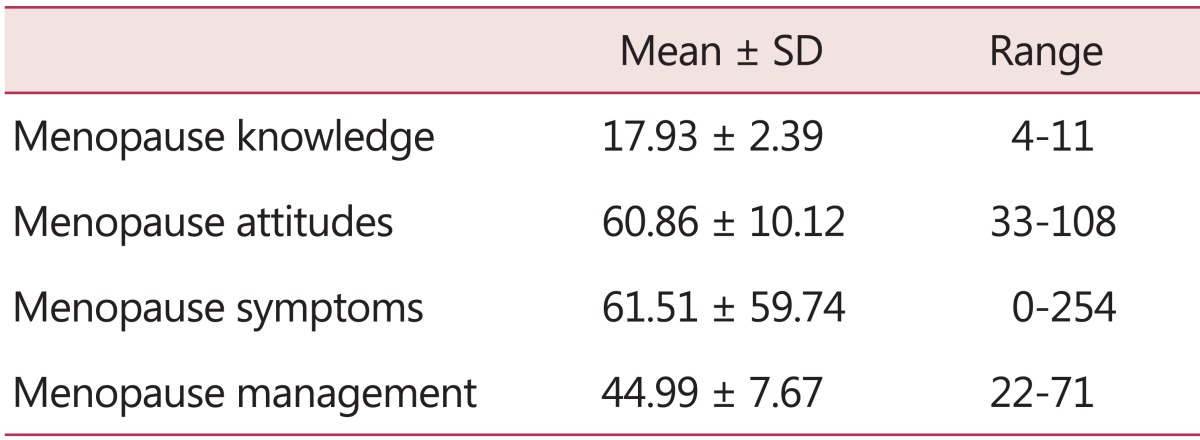
SD: standard deviation
3. Menopause knowledge, attitude and symptom according to management
There were no statistical differences in menopause knowledge according to menopause management between two groups. However, menopause knowledge was higher in the group with poor meal management than the group with good meal management (P < .01). No significant differences were found in sexual life, self-regulation and professional management (Table 2).
Table 2.
Difference of menopause knowledge according to menopause management (N = 189)
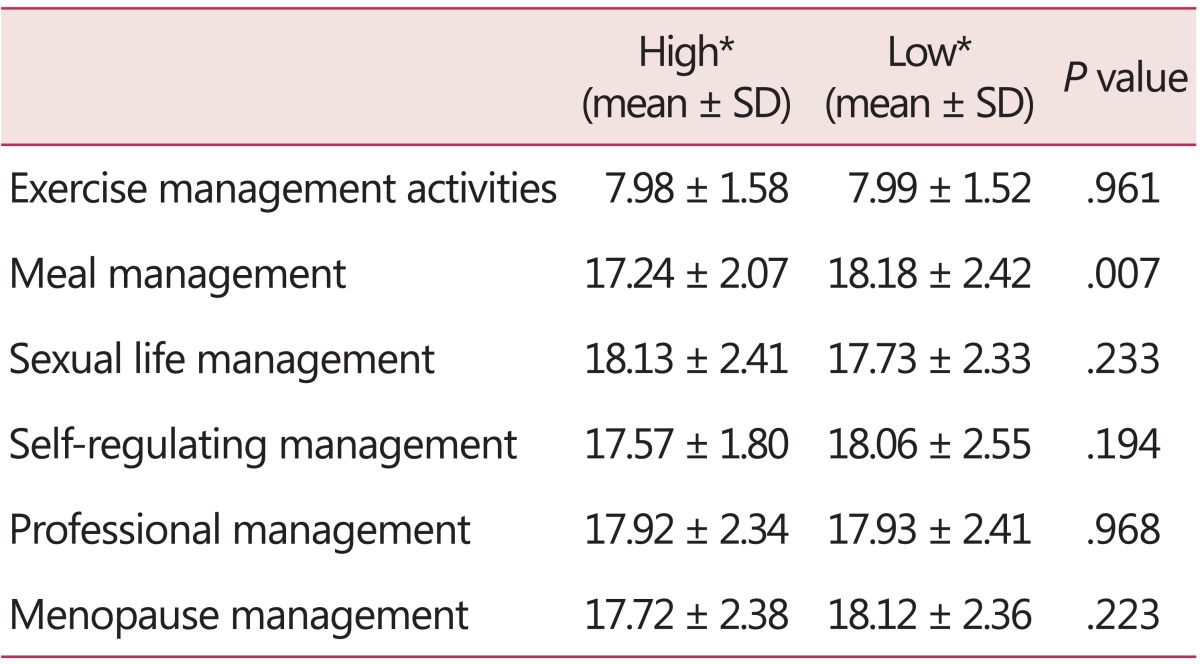
High > average, Low < average
*Mean ± SD, P value < .01
SD: standard deviation
There were statistical differences in menopause attitudes between two groups. However, menopause attitudes was higher in the group with better management in meal and sexual life than the group with poor management (P < .05). The difference was significant in the group with better sexual life management than the group with poor sexual life management (P < .01). The group with better performance in meal and sexual life management had more positive attitudes toward menopause. No significant differences were seen in self-regulating and professional management (Table 3).
Table 3.
Menopause attitudes and symptoms score difference according to menopause management (N = 189)
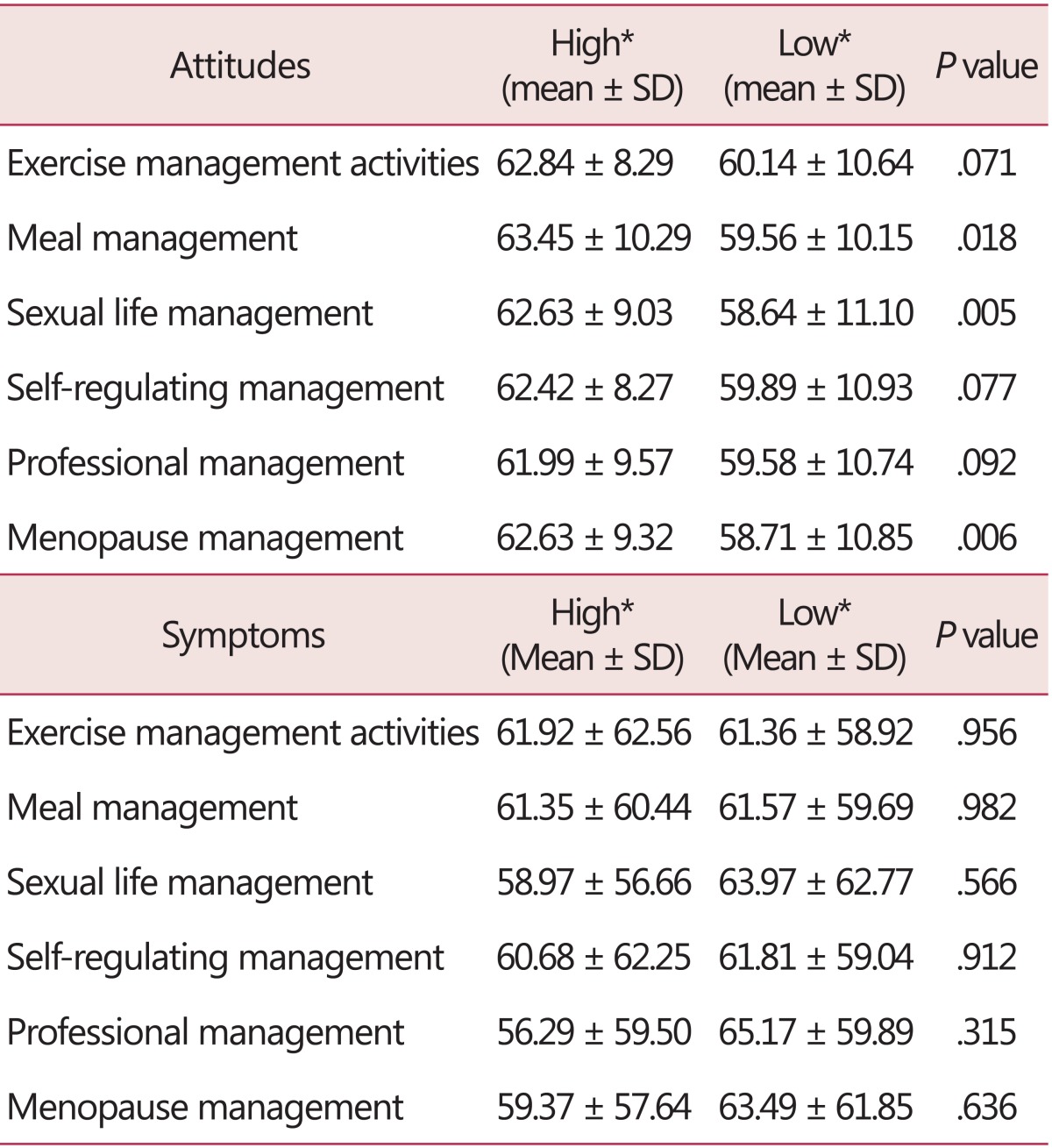
High > average, Low < average
*Mean ± SD, P value < .05, P value < .01
SD: standard deviation
No significant difference was found in menopause symptoms according to menopause management. However, menopause symptoms was higher in the group with poor performance in meal, sexual life and professional management. Menopause symptoms score was higher in the group with better self-regulating management (Table 3).
4. Menopause knowledge, attitude, symptom and management according to menopausal period
Statistically significant difference was not found in menopause knowledge according to menopausal period (t = 1.90, P = .061). No significant difference was detected in overall menopause attitudes according to menopausal period.
Difference in overall menopause symptoms according to menopausal period was significant higher in the perimenopausal group than the menopausal group (P < .01). By subscale, difference of physical symptoms was significantly higher in the perimenopausal group compared to the menopausal group (P < .01). Difference of psychosomatic symptoms was significantly higher in the perimenopausal group compared to the menopausal group (P < .05). The results suggested that physical and psychosomatic symptoms were markedly higher in perimenopausal women compared to menopausal women. Significant difference of self-regulating management was found in menopausal women compared to perimenopausal women (t = -2.607, P = 0.011). However, no significant difference was seen in activity and exercise, meal, sexual life and professional management (Table 4).
Table 4.
Menopause attitude, symptom and management score difference between perimenopause and menopause (N = 142)
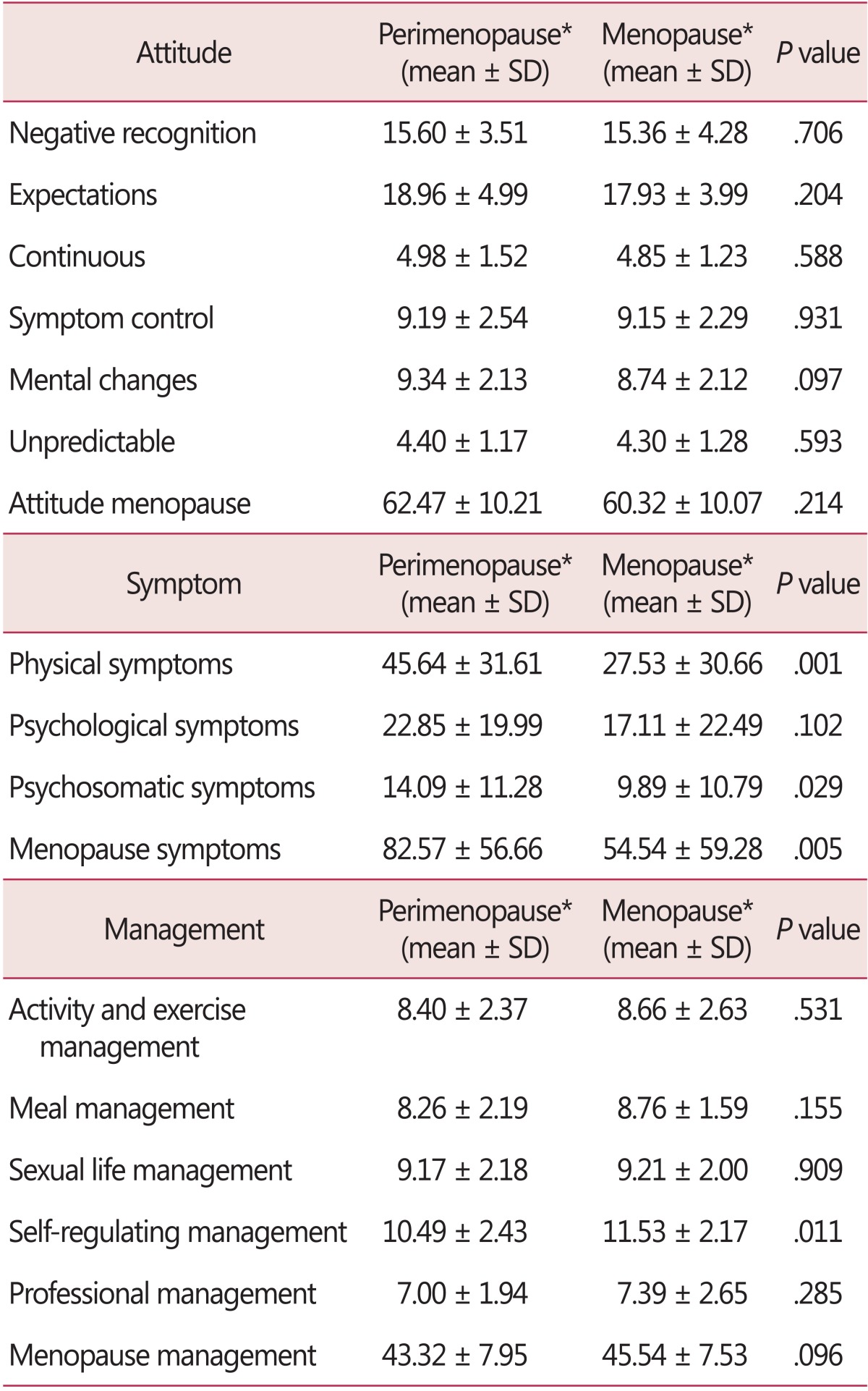
*Mean ± SD, P value < .05, P value < .01
SD: standard deviation
5. Correlations of knowledge, attitudes, symptoms and management toward menopause
A positive correlation was found between menopause attitudes and menopause management (r = 0.221, P < .001; Table 5).
Table 5.
Correlation analysis of menopause knowledge, attitudes, symptoms and management
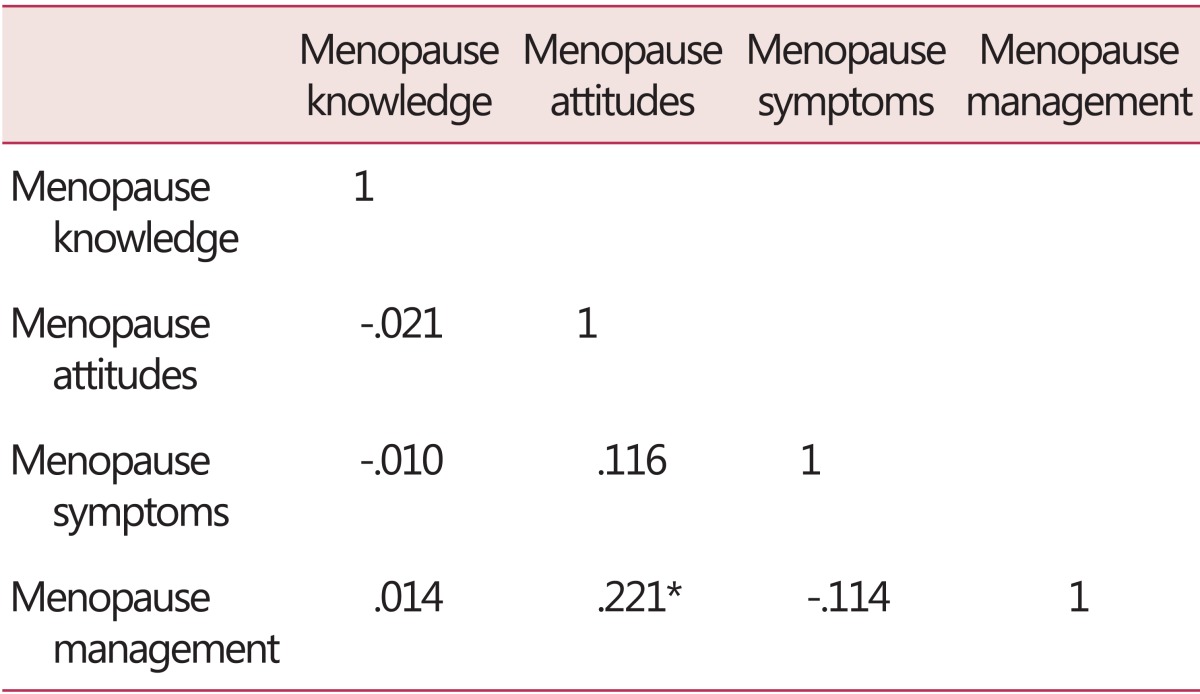
*P value < .001
Discussion
According to general characteristics, difference in the knowledge levels about menopause was found by age. Differences were found in menopause attitudes according to age, educational attainment, occupation and spouse. In regards to menopause knowledge and attitude according to general characteristics, more educated and younger women were more likely to have knowledge about menopause. The mean score of menopause knowledge was 9.0 out of a perfect score of 17.0 points, showing a significant difference according to educational attainment and the average monthly household income. Women with insufficient or incorrect knowledge about menopause need to be encouraged to participate in health management activities for better knowledge and care.14 In regards to menopause knowledge according to educational background, less educated women were more likely to be concerned with menopause.5 The mean score on knowledge about child-bearing potential, menopause symptom and menstrual irregularity was high. These findings support the results of previous studies.12,14,15 Thus, menopause knowledge was found to be crucial in improving ability to manage menopause. The outcome indicates that wider database is required to develop educational programs tailored for menopause in order to improve the degree of knowledge on menopause in midlife women.
The findings supported that the knowledge and attitude are meaningfully related to economic status and education level. But, the relationship between knowledge and attitudes of women under study was not significant.3 Women of lower age with higher education backgrounds had positive attitude toward menopause, and postmenopausal women also showed positive attitude than women before menopause in this study.5
The group with a lower score in menopause symptoms had a higher score in meal, sexual life and professional management, while the group with a higher score in symptoms had a lower score in self-regulating management. However, statistically significant difference was not found. A significant inverse correlation between climacteric symptom and menopause management was demonstrated in a study conducted by the Korea Centers for Disease Control and Prevention (KCDC). Women who were less likely to manage menopause reported more climacteric symptoms, and a significant inverse correlation was observed between climacteric symptom and the degree of menopause management. Menopause symptoms exhibited no significant difference according to the degree of management in this study. Therefore, further studies are needed in order to warranted to clarify the exact cause for the absence of significant difference in menopause symptoms. The most common symptom was severe fatigue in menopausal women, and skin rash in non-menopausal women. The least common symptom was nasal bleeding in menopausal women, and frequent lying down in non-menopausal women. These findings suggest that there is a difference in symptom between menopausal and non-menopausal women.
A low level of management on postmenopausal sexual life was found on the study of Choi and Park.16 A recent study reported urogenital atrophy, lack of sexual desire and other symptoms according to menopausal period.5 Changes in sexual life during climacteric period are not the causes of menopause, but rather based on natural changes. In addition, it is important to have confidence to sustain sexual life. Taking these aspects into consideration, multidimensional nursing interventions are essential. Although severe pain and discomfort progress in the late stages of the menopausal transition, these symptoms are often neglected, implying that menopause management is urgent in Korean women.
According to a study of the KCDC5 and Kim and Lee,17 menopause management was comparable before and after menopause, showing no significant difference. These results are attributable to disinterest in physiologic, social and psychological changes and problems that arise during menopause and beyond. The awareness of menopause management and operation of nursing intervention are thought to be crucial.
The structured teaching programme was found to be an effective strategy to increase the knowledge of women regarding menopausal symptoms and its management.14 Factors affecting menopause management were educational background, religion and monthly income, showing significant difference in a study of Song.18 These previous studies reported contradictory results. The outcomes seem to be resulted from some Korean women who accept menopause as a natural transition process without taking any response measure after menopause. Factors affecting bone mineral density (BMD) were anthropometric measurements, serum concentrations of minerals and nutrient intake in perimenopausal women, while age, menarche age, serum concentrations of bone biochemical markers, dietary pattern, walking time and exercise frequency seemed to have greater influence on BMD in postmenopausal women. For these reasons, education on appropriate diet is thought to be crucial.19
According to correlations of knowledge, attitudes, symptoms and management toward menopause, a positive correlation was found betweenS attitude and management in this study. Women with positive attitudes toward menopause were more likely to manage menopause better. Lim5 found that women with positive attitudes was able to manage menopause through regular exercise, demonstrating comparable results with this study. According to Park and Lee,12 Korean postmenopausal women had more negative attitudes toward menopause and a low level of performing health-promoting behaviors. Hot flush is one of the most commonly reported symptoms during menopause and it is referred to as vasomotor symptoms along with night sweats.20 Studies have reported that there is a significant increase in the knowledge of women regarding menopausal symptoms and its management.14 They obtained menopause-related information through various sources, and the role of mass media has been greatly increased.21 Therefore, further studies with larger sample sizes are warranted to obtain consistent results. Middle-aged women need to be educated properly by developing and implementing educational programs for preventive management before menopause starts, instead of managing menopausal symptoms after menopause.
Conclusion
This study was found that the group of the women in the menopause had the remarkably high level of physical symptom, psychosomatic symptom than the group of the women in around the menopause. The findings of this study suggest that comprehensive education which is delivered as soon as possible on knowledge, attitude, symptom and management of menopause should be regarded as crucial for Korean midlife women. Education and intervention programs on menopause symptoms are thought to be essential in middle-aged women.
Physical, mental, psychological and social aspects need to be taken into consideration in developing appropriate programs. In addition, the tailored pre-, peri, postmenopausal educational intervention is required according to status, symptoms and severity of menopause.
Overall, it is thought that it is necessary to make a nursing plan for health and wellbeing of middle-aged women in the menopause by developing and providing the health promotion program for them and minimizing their feeling of discomfort in the menopause as midlife women in the menopause had the low degree of performing menopausal management.
The findings of this study are limited to midlife working women at peri- or postmenopausal stage, and cannot be applied to the general women population for the following reasons:
First, further multidimensional studies are warranted to clarify relationships between knowledge, attitude, symptom and management toward menopause considering physiological and psychosocial aspects in middle-aged working women.
Second, additional studies are required to determine the exact causes for the absence of significant difference in menopause symptoms in midlife employed women according to menopause management.
Third, the degree of implementing menopause management was low in overall of midlife working women. Hence, nursing care needs to be provided to minimize menopausal discomfort by developing menopause management programs for middle-aged women.
Footnotes
No potential conflict of interest relevant to this article was reported.
References
- 1.Statistics Korea. 2012 life tables for Korea. Daejeon: Statistics Korea; 2012. [Cited by 2014 March 20]. Available from: http://kosis.kr/statisticsList/statisticsList_01List.jsp?vwcd=MT_ZTITLE&parmTabId=M_01_01#SubCont. [Google Scholar]
- 2.Yeo JH. Sex-role attitude and management of menopause among middle-aged women in a local area. J Korean Soc Matern Child Health. 2004;8:199–210. [Google Scholar]
- 3.Noroozi E, Dolatabadi NK, Eslami AA, Hassanzadeh A, Davari S. Knowledge and attitude toward menopause phenomenon among women aged 40-45 years. J Educ Health Promot. 2013;2:25. doi: 10.4103/2277-9531.112701. [DOI] [PMC free article] [PubMed] [Google Scholar]
- 4.Han MJ, Lee JH. Factors influencing self-identity and menopausal symptoms on level of depression in middle aged women. Korean J Women Health Nurs. 2013;19:275–284. doi: 10.4069/kjwhn.2013.19.4.275. [DOI] [PubMed] [Google Scholar]
- 5.Lim KY. The study of menopause-related quality of life and management of climacteric in a middle-aged female population in Korea. Public Health Wkly Rep. 2013;6:609–613. [Google Scholar]
- 6.Yum SK, Yoon BK, Lee BI, Park HM, Kim T. Epidemiologic survey of menopausal and vasomotor symptoms in Korean women. J Korean Soc Menopause. 2012;18:147–154. [Google Scholar]
- 7.Lee JW, Yeoum SG. Climacteric women's life style and acceptance about menopause. J Korean Soc Menopause. 2003;9:254–260. [Google Scholar]
- 8.Polit DF, LaRocco SA. Social and psychological correlates of menopausal symptoms. Psychosom Med. 1980;42:335–345. doi: 10.1097/00006842-198005000-00004. [DOI] [PubMed] [Google Scholar]
- 9.Neugarten BL, Wood V, Kraines RJ, Loomis B. Women's attitudes toward menopause. Vita Hum. 1963;6:140–151. doi: 10.1159/000269714. [DOI] [PubMed] [Google Scholar]
- 10.Choi MS. Effects of a program for relieving menopausal symptoms [dissertation] Seoul: Korea University; 2002. [Google Scholar]
- 11.Im EO, Chee W, Bender M, Cheng CY, Tsai HM, Mi Kang N, et al. The psychometric properties of Pen-and-Pencil and Internet versions of the Midlife Women's Symptom Index (MSI) Int J Nurs Stud. 2005;42:167–177. doi: 10.1016/j.ijnurstu.2004.06.005. [DOI] [PubMed] [Google Scholar]
- 12.Park JS, Lee YE. Effects of integrated menopause management program for middle aged woman. Korean J Women Health Nurs. 2011;17:10–20. doi: 10.4069/kjwhn.2011.17.1.10. [DOI] [PubMed] [Google Scholar]
- 13.Song AR. Development of and educational program for the management of menopause and it's effect. J Korean Acad Nurs. 1998;28:280–290. [Google Scholar]
- 14.Patel V, Koshy S, Ravindra HN. Effectiveness of structured teaching programme on knowledge regarding menopausal symptoms and its management among women. IOSR J Nurs Health Sci. 2014;3:22–26. [Google Scholar]
- 15.Jung HY. Sex-role attitude and management of menopause among middle-aged women in a local area. J Korean Soc Matern Child Health. 2004;8:199–210. [Google Scholar]
- 16.Choi SJ, Park KM. The relationship between menopause management practice and low back pain in climacteric women by menopausal stage. J Korean Soc Matern Child Health. 2000;4:71–81. [Google Scholar]
- 17.Kim MS, Lee YS. A study on the menopause management practice and the quality of life in climacteric women. J Korean Soc Matern Child Health. 1999;3:75–87. [Google Scholar]
- 18.Song AR. An analysis of the relationship between climacteric symptoms and management of menopause in middle-aged women. J Korean Acad Soc Nurs Educ. 2001;7:308–322. [Google Scholar]
- 19.Park J, Choi M, Lee S, Choi Y, Park Y. The association between bone mineral density bone turnover markers, and nutrient intake in pre- and postmenopausal women. Korean J Nutr. 2011;44:29–40. [Google Scholar]
- 20.Chun S. The relationship of hot flush to other menopausal symptoms and chronic disease related to menopause. J Korean Soc Menopause. 2013;19:54–63. [Google Scholar]
- 21.Chung YJ, Kim MR, Jeong HW, Yoon BK, Lee BS, Kang BM, et al. Changing Korean menopausal women's awareness on hormone therapy: 7-years after women's health initiative study. J Korean Soc Menopause. 2012;18:94–99. [Google Scholar]


